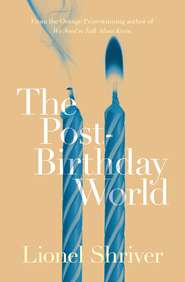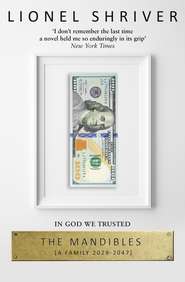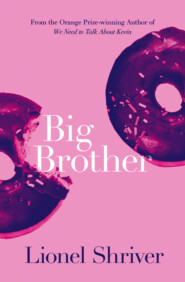По всем вопросам обращайтесь на: info@litportal.ru
(©) 2003-2024.
✖
A Perfectly Good Family
Автор
Год написания книги
2018
Настройки чтения
Размер шрифта
Высота строк
Поля
He always cooked in the dovecot, and that was reason enough, as he always had the same breakfast, mowed the lawn the same day of the week, and now that he was in college I figured that Duke’s varying his academic schedule must have plunged him into interior disarray for half of every semester. Truman’s disciplines were so strict not because they were solid but because they were shaky. In my little brother’s personal mythology, should he nibble a single biscuit between meals, lift weights on Friday instead of Thursday, or allow himself an extra half-shot of bourbon before bed, he would degenerate into a flabby dissolute overnight. Truman trusted everyone but himself.
As I unpacked, Averil swayed in the doorway, her eyes following each pair of jeans to its drawer. She seemed to be counting them, like Truman and my glasses of wine.
“Whatever happened with your room-mates?” she inquired. “You said one was cute.”
“I said they were both cute.”
“Which one did you like better? The runty guy with glasses, or the drunken thug?”
I laughed. “In Britain, you’d say hooligan. Which he wasn’t, quite. But which did I like better? I guess I never made up my mind.”
“Well, did you ever, you know?” Averil may have found my sexual peripatetics “disgusting”—her favorite word—just as Truman himself lumped everyone I had ever dated into the categories of “lunatic” or “waste product.” Yet like most who married as virgins or nearly so, she displayed a disapproving but keenly prurient curiosity about the love lives of the wayward.
“It’s inadvisable,” I said, “to get romantically involved with flatmates. Even in South Ealing, flats are expensive and hard to come by; you don’t want to complicate matters. The three of us were agreed on that.”
“So you left them alone after all?”
“After all,” I said, “they have left me alone. I will miss them.”
“What’s that?”
I had unwrapped a piece of ceramic from my leggings, and set it on the dresser by the wobbly elephant from my first firing at ten. “A souvenir.”
“Can I see it?”
I shrugged.
My sculptures were distinguished by their hands: oversized in relation to the figure and always finely wrought, attenuated fingers extended from a tendonous metacarpus. The severed hand Averil now rested in her palm was reaching for something, or someone, and without the rest of the figure attached no longer appeared youthfully desirous, but merely grasping.
“It’s beautifully done,” she admired. “I can’t imagine making something so delicate out of clay. But why is it broken off?”
“Because that’s the left hand,” I explained, “and it didn’t know what the right one was doing.”
We trudged up the second flight of stairs where, according to Truman’s lore, we were entering another residence altogether. If I were to assert that my younger brother had never left home by thirty-one, he would object. Ten years before, he’d refurbished the top floor into an independent flat; he liked to regard the fact that his address tags still read “309 Blount Street” and his zip code hadn’t changed since he was two as mere coincidence.
We had designated the third floor “the dovecot,” since the mansard roof was infested with pigeons, though the scampering overhead could sound ominously like rats. The pigeons had nested on the pediments over the dormer windows, whose overhangs didn’t protect the panes from being continually splattered with bird poo. Truman spent a lot of time squeegeeing. Truman lived to squeegee; all the humdrum toil my father deplored as distraction from the Great Questions my little brother regarded as the meat of life.
I did feel a release on rising to the long central room in Truman’s hideaway, with its tall, round-headed window at the end, where the spiral staircase curled to his tower. The rooms adjoining this one all had at least one sloping wall, from the slant of the roof; in the cockeyed tilt lurked a sense of humor, which the ponderous lower floors could well afford. Truman’s aesthetic may have been backward-looking, but in the runaway eclecticism of downstairs there was no coherent aesthetic at all. He had a prejudice against any furniture made in his lifetime, which suggested a self-dislike. I think if Truman could have wished himself back a hundred years he would. He was always pining about the days when hard work was rewarded and a man was a man and you did what you had to do and life was simple. I personally didn’t believe life was ever simple, though I could see fancying the illusion. Truman hated his own time, and expressed his nostalgia in bygone appointments, mostly glommed from the boot sales of other children with dead parents. His offbeat furniture wasn’t restricted to a single era—his couch was Victorian, end-tables Edwardian, and there was one upright armchair in his living room, ridiculously carved, that I do not believe belonged to any era at all. But together the hodgepodge formed a family whose members all got along, which was more than you could say for ours.
Here in the middle room he’d laid their hefty darkwood table, solidly built and lovingly refinished. They don’t make things the waythey used to—if you listened to Truman from around a corner you might mistake him for his grandfather, except that my father’s father was not the least bit sentimental about the olden days, was grateful for central heating, and had recently installed his own fax.
We dined on grilled skinned chicken thighs, a mound of rice fluffy with a scant tablespoon of butter and steamed broccoli. I had shared this meal before, and variations followed similar nutritional lines. If I asked my little brother what he believed, leaving aside his convictions about architecture which were equally fanatical, his leading catechism would underscore that carbohydrates must be relied upon for caloric mainstay; in place of deity he would exalt dietary fiber. Amid the malign influences in Truman’s universe, fat ranked first. He might not have gone so far as to call obese people evil themselves, but they were at least the devil’s playground. While my father had got worked up over a black woman dying because she was not admitted to white Rex hospital, his second son only displayed similar choler when a documentary asserted that some people were born fat and couldn’t help it. The worst of determinism, in Truman’s mind.
I shouldn’t complain; if the food was plain it was impeccably prepared—six and a half minutes per thigh side on the second notch down on the grill, one cup rice to one-and-a-third cups water less one tablespoon. Truman was precise, and, in spite of his highfalutin’ and ham-handed father, my brother’s worldview was essentially mechanical.
“Before we meet with the lawyer tomorrow,” Truman mentioned, and swallowed, “I thought you and I might talk about—” when he dabbed his mouth casually, his hand trembled “—the house.”
“What about it?”
“Mordecai’s going to want his share in cash.”
“Probably.”
“He’s a philistine. But what about you?”
We would not hear the details of the will until the following afternoon, but my parents had prepared us for their estate being evenly divided among the three heirs. They must have been sorely tempted to disinherit the eldest altogether, but their idea of themselves as fair liberal parents who did not have preferences among their children won the day.
“Have you a clue how much dosh is left—”
“Dosh?” Truman’s eyes narrowed.
“Money. On top of the house?”
“Nope. With the dosh I saw Father mailing off to every Negro-something charity he could find I bet we’re not coming into a windfall. Still, Father’s salary from the Supreme Court must have accumulated to something. If my share of the cash is enough, I’d be willing to buy both you and Mordecai out.”
“Uh-huh.” I picked a tendon from my teeth. “Since Oakwood has gentrified, this place has appreciated by a factor of several times. I doubt you’ll have the resources.” I found myself hoping that he would not. “What’s Plan B?”
“Well, you and I could buy Mordecai out together,” said Truman promptly.
“Uh-huh.”
“And then, little by little, after I finish my degree and get a job, I could pay you off and eventually you’d get your money, I promise. We could even draw up a contract, with some moderate interest …”
“Uh-huh.” I folded my arms. “In any case, you want to be the one who owns Heck-Andrews. At the end of the day.”
“Well.” He shrugged. “Yeah.”
“But it’s my house, too.”
“In a way.”
“Not in a way. Legally, emotionally, historically—I grew up here, they were my parents as well, and it is partly my house.”
“Okay!” He backed off, but he still didn’t appear to accept that I had, much less Mordecai had, any legitimate claim on what he had already, our mother two weeks dead, assumed as his own property. “The main thing is, we should try and keep it in the family. The last thing we want is to have to sell. Right?”
I didn’t answer.
“Right, Corlis?” He was panicking.
It’s chilling how clinical one can be in the midst of grief, but I had given this matter some thought. I did figure Mordecai would want the money, that Truman wouldn’t come into enough liquid assets to buy us both out, and I could conceivably force the house on to the market. Just as Truman’s impulse with Mordecai and the Britannicas was to deny him the prize, I was tempted to take Heck-Andrews from Truman precisely because it was the one possession he most desired.
“I might go in with you.” I tapped my fork on the table. “But not with the understanding that you eventually buy my share. If I’m going to have a half-interest in this property, I’m going to stay interested.”
Truman looked mystified, and paused in his hoovering of rice. “Why? You live in London.”
Averil mumbled, “Ask her why she brought six pairs of jeans.”
“Don’t you?” he pressed.











